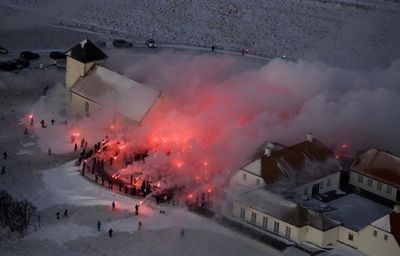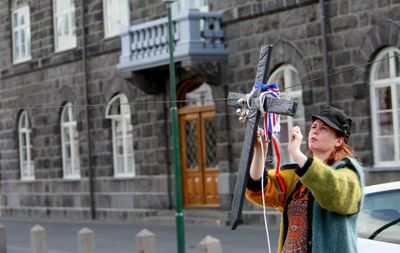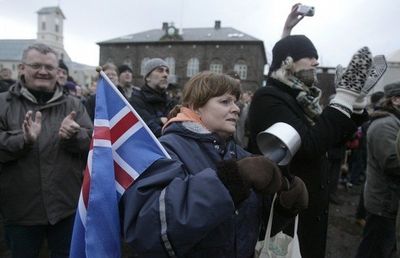6.1.2010 | 12:50
My contribution to the international press
The constitutional crisis provoked by the Presidential veto to a law in Iceland is a result from a direct call from the citizens asking for direct democracy and requesting that social justice and human rights are taken into account in the present and future construction of the European internal market.
Did the EU and the EEA failed Iceland?
By M. Elvira Mendez-Pinedo, Associate Professor of European Law. University of Iceland
There is a present misunderstanding in the foreign media that Icelanders do not want to pay depositors in Europe who lost their savings within the Icelandic banks after their collapse in October 2008. This is not correct as the legal situation stands now. Iceland already passed a law in September 2009 agreeing to pay depositors and honour its international obligations. This law was approved by most political parties but it contained some reservation clauses to protect the economic future, sustainability and even existence of this tiny country composed by rouhgly more than 300.000 inhabitants.
 Because the UK and Holland did not agree to Icelandic reservations, new negotiations started and a new law was presented to the Parliament by the Government. This new law was passed on the 30th December 2009 but it deprived Iceland of the previous reservations that guaranteed its economic future and development. Strong fears for a massive exodus out of the country are present in the Icelandic minds. More than 60.000 Icelanders, 25% of the electorate, requested the President to submit this new bill to a national referendum. President of Iceland, Olafur Ragnar Grimsson, announced yesterday his decision not to sign the new Icesave Bill which was passed by Icelandic parliament just before the New Year. It is his intention to send the law to a national referendum as soon as possible.
Because the UK and Holland did not agree to Icelandic reservations, new negotiations started and a new law was presented to the Parliament by the Government. This new law was passed on the 30th December 2009 but it deprived Iceland of the previous reservations that guaranteed its economic future and development. Strong fears for a massive exodus out of the country are present in the Icelandic minds. More than 60.000 Icelanders, 25% of the electorate, requested the President to submit this new bill to a national referendum. President of Iceland, Olafur Ragnar Grimsson, announced yesterday his decision not to sign the new Icesave Bill which was passed by Icelandic parliament just before the New Year. It is his intention to send the law to a national referendum as soon as possible.
Under Icelandic law, the President’s decision means that the law approved by the Parliament will go into force; but also that it will be withdrawn again in the event of the Icelandic public voting ‘no’, whenever the referendum goes ahead. If the referendum was to be negative, the previous Icesave-Bill passed by the Icelandic Parliament in September 2009 would then be into force.
At any event, Iceland is assuming its international obligations. What Icelanders are requesting is not to be deprived of the clauses agreed in the summer by their Parliament which guarantee the economic sustainability of one of the smallest countries of Europe.
http://www.icenews.is/index.php/2010/01/05/declaration-by-the-president-of-iceland/
At the same time the Government has announced that Iceland is committted to debt repayment.
http://www.icenews.is/index.php/2010/01/05/government-iceland-still-committed-to-debt-repayment/
Some more political analysis of the context of the „veto“ expressed by the President of the Republic.
http://www.icelandreview.com/icelandreview/daily_news/?cat_id=29314&ew_0_a_id=356127
With reference with these events, I would like to send you some background information regarding the views of Icelandic people and why this subject is so controversial. My main worry today is that the foreign media misunderstands what is happening in this country and this is the reason why I am sending you this letter.
I trust you to take account of this background information as it explains the constitutional difficulties of this country in a dispute that will define history between the EU and Iceland. I also send you a copy of the Report I did for the Icelandic Parliament on June 2009 on the issue of State liability for breaches of EEA law and the Ice-save dispute.
Yours sincerely,
Maria Elvira Méndez Pinedo
Doctor in European Law
Associate Professor of European Law
Faculty of Law. University of Iceland.
Sudurgata s/n. Lögberg 306.
101 Reykjavík. Iceland
Tel: 00 354 5255224
It has been referred in the foreign media that Icelanders do not want to compensate depositors in the UK and Holland who missed their savings in the Ice-save accounts from Landsbankinn. This is not exactly true. The situation is far much more rich and complicated and offers a lesson of democracy for the construction of Europe.
To make it short, I think that Icelanders are not protesting per se the European obligations to compensate Dutch and British citizens for the minimum guarantee deposits they are entitled according to the European law. There seems to be fundamental agreement in the society that we have to comply with our international obligations and that is why a previous Ice-save bill was approved in summer 2009 with most of the political parties participating in that bill.
 What Icelanders are requesting is social justice.
What Icelanders are requesting is social justice.
In fact, I could have agreed with both yes and no votes in the Parliament. This is because I think that the methodology to solve this dispute is not appropriate. What is very difficult for citizens is to accept the social injustice of the agreement reached, that the Icelandic public bear the losses and covers the debt of private companies while the profits were private and all the assets seem to be now safely stored in tax heavens.
For me the only way to properly solve this dispute which mixes political, economical, legal, ethical and sociological aspects is in a comprehensive way, tackling all issues together and showing Icelandic citizens that justice is also part of the deal. So the current loan agreements are a temporary part of the battle towards final justice.
So, I think everybody agrees that it is fair that Iceland assumes its European obligations towards depositors in the UK and Holland while the legal issues are pending because legal problems take time to be solved. But this is only while the fundamental questions that lie at the core of this issue are tackled. The final goal should be that the responsible individuals and institutions assume responsibility and compensate for the damage caused after the proper criminal/civil research has taken place. The final goal should be that citizens are not directly ordered to pay the bill for the damage caused by private companies.
Any Civil Code in the world states that the one who causes damage to other, by action or inaction, is obliged to pay for the damage caused.
Icelandic citizens are protesting the current Ice-save agreements because they have been sent the final bill of the Ice-save debt without any other alternative being properly explained nor implemented. This is a strong criticism against their own governent. There is also strong criticism against the UK and Holland becuase of their hard stand against Icelandic citizens.
The solution of the Ice-save dispute from a social justice perspective would mean adopting a comprehensive strategy that must include simultaneously all the following elements:
 1. Agreement to reimburse the UK and Holland to the equivalent of the deposits plus a reasonable interests. Is 5.5.% a reasonable interest when a European country and its citizens have to pay for it and not commercial banks?
1. Agreement to reimburse the UK and Holland to the equivalent of the deposits plus a reasonable interests. Is 5.5.% a reasonable interest when a European country and its citizens have to pay for it and not commercial banks?
2. Agreement that contracts should be based on the principles of European law and that includes fundamental rights both of States and individuals. It is essential not to deprive Iceland the access to justice before the proper European courts who are the only competent to interpret European law in the last instance, let it be the European Court of Justice or the EFTA Court. Is it fair that Iceland has no access to the European Courts in this dispute?
3. Agreement that the EU should exercise a proper mediation role in this dispute, based on the principles of solidarity between European nations, without deriving the issue to the IMF and therefore depriving Iceland of procedural rights under the EEA Agreement. As Eva Joly has pointed out, is it fair that Iceland pays alone for a defective European legislation that lacked proper guarantees and cross-border supervision in the internal market of financial services?
4. Agreement that the Icelandic Government and the EU should properly explain to Icelandic, British and Dutch citizens why the EU is not present at the resolution while this dispute is so closely related to the internal market and the lack of proper European rules on the functioning of the financial markets. Is it fair that Iceland pays alone when the European legislator created a weak system of national guarantees for depositors without the back up of the European Central Banck that could not cope with a systemic bank collapse?
5. Agreement that the EU and the Icelandic Government explain why there is not any macroeconomic assistance to Iceland from the EU such as for other countries (ie: Ukraine 2009) in spite of former Commissioner Joaquín Almunia proposing this in the autumn 2008. Is it fair that Iceland gets worse treatment than other countries in the continent?
6. Agreement that any loan contracts to Iceland should take into account its financial difficulties and should not oblige it to waive its sovereign immunity. Is it fair to that creditors can seize inmediately hospitals, schools, all assets necessary for the normal functioning of the country?
7. Agreement not to waive the right to exercise legal claims for the use of UK anti-terrorist legislation against Iceland. Is it fair that Iceland forgets about this act of legal violence while the British politicians talk about justice?
8. Agreement that the Government and the Althingi and the judicial power in Iceland will aim to transfer the responsibility and the final debt to all those responsible for the bank collapse and the Ice-save debt. This includes freezing as a preventive measure all the assets of people (individuals owners of banks, members of board administrators, people holding public office) who in principle are responsible (active or passively, by fault or negligence) and should be under investigation.
9. Agreement that the Truth Committee Report to be published in 2010 in Iceland will be properly followed by the correspondent criminal or civil claims before the courts so that all assets relating to the Ice-save dispute are recovered.
Furthermore, I suggest that we should consult Mr Jacques Delors who is still today one of the most respected leaders of opinion in Europe. He has the knowledge of the internal market and of the European integration and all the skills needed to give good advice on this dispute. He has published several articles recently criticizing the EU for lacking courage and leadership and missing this historic opportunity to prove that there is a better future for all European citizens. Social justice is needed in the aftermath of the financial crisis and Mr. Delors not only defends social justice but he also knows what is needed to save the future of European integration.

|
Vöruđu viđ afleiđingum synjunar |
| Tilkynna um óviđeigandi tengingu viđ frétt | |
Flokkur: Stjórnmál og samfélag | Breytt s.d. kl. 13:31 | Facebook


 axelaxelsson
axelaxelsson
 agbjarn
agbjarn
 bjarnimax
bjarnimax
 eyvar
eyvar
 rustikus
rustikus
 einarbb
einarbb
 eirikuro
eirikuro
 eyrun
eyrun
 iador
iador
 himmalingur
himmalingur
 ingibs
ingibs
 islandshreyfingin
islandshreyfingin
 fun
fun
 jevbmaack
jevbmaack
 jonasantonsson
jonasantonsson
 nonniblogg
nonniblogg
 jonvalurjensson
jonvalurjensson
 juliusvalsson
juliusvalsson
 photo
photo
 margretsverris
margretsverris
 omarbjarki
omarbjarki
 oskvil
oskvil
 ragjo
ragjo
 redlion
redlion
 sjos
sjos
 siggi-hrellir
siggi-hrellir
 siggith
siggith
 savar
savar
 valli57
valli57
 tbs
tbs





Athugasemdir
Thank you for this article. It is uplifting and reasonable.
Regards,
Sveinbjörn
Sveinbjörn (IP-tala skráđ) 6.1.2010 kl. 13:20
Thanks!
Villi Asgeirsson, 7.1.2010 kl. 15:31
Bćta viđ athugasemd [Innskráning]
Ekki er lengur hćgt ađ skrifa athugasemdir viđ fćrsluna, ţar sem tímamörk á athugasemdir eru liđin.